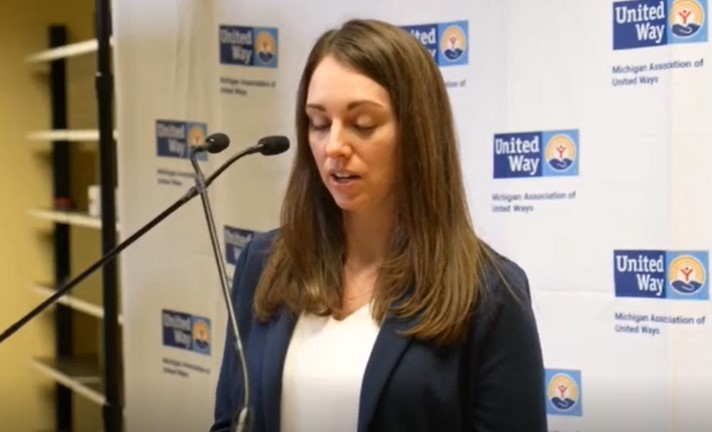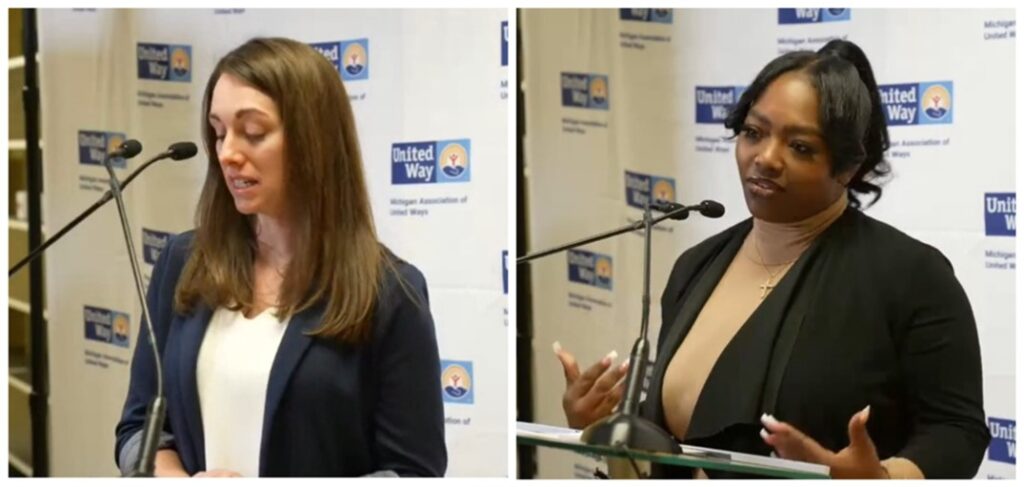
LANSING – A news conference spotlighting financial hardship in Michigan included powerful stories of life for families that have experienced that hardship.
The April 26 news conference, spearheaded by the Michigan Association of United Ways (MAUW), shared the latest findings on ALICE, which stands for Asset Limited, Income Constrained, Employed. ALICE households are those with income above the Federal Poverty Level but below what it takes to make ends meet.
Hassan Hammoud, President and CEO of MAUW, noted that the new ALICE report provides the first look at financial hardship in Michigan since the start of the COVID-19 pandemic.
“The report gives us a clearer picture of Michigan families and the many challenges many of our neighbors, loved ones and fellow Michiganders continue to face because of the pandemic,” he said.
According to the report, based on 2021 data, 13% of Michigan families live in poverty and 26% are above poverty but below the ALICE Threshold. Economic struggles are especially keen among Black, Indigenous and People of Color (BIPOC) households.
Kim Trent, Deputy Director For Prosperity, MI Department of Labor and Economic Opportunity, leads the Michigan Poverty Task Force. She told news conference attendees that the ALICE report shows there’s much work to do for struggling families.
“Michiganders should not have to struggle to afford basic necessities like housing, child care, food and health care,” she said. That includes limited access to mental health care, even though low-income families report high levels of anxiety and depression because of financial worries.
Former ALICE Shares Story
Bethany Broom-Dombrowski shared how, as a 23-year-old single parent in 2011, she worked full-time as a Head Start teacher, making $30,000 a year, yet couldn’t keep up with her monthly expenses. Her three-year-old daughter attended local daycare and preschool programs, which cost $30 a day without meals.
Fortunately, Broom-Dombrowski received the Earned Income Tax Credit, which covered about five weeks of daycare.
“The money I did receive was a huge relief because my take-home pay never seemed like enough, especially after taxes, paying for high-cost and high-deductible health insurance while also trying to put money into my 403(b) for retirement and contribute to my daughter’s Michigan Education Savings Account,” said Broom-Dombrowski. “I wanted to do the right thing. And while this may have seemed unnecessary to some, I wanted to save my money for my and my daughter’s future.”
When Broom-Dombrowski’s student loans came due at that time, things got even tougher.
“I felt like I was on a never-ending marathon, living paycheck to paycheck,” she said. “Trying to achieve financial stability can be exhausting and it trickles down to children.”
She was struck by how many of her students faced harder times.
“Some kids would come without basic things like underwear or warm coats,” she said. In one case where a young student’s coat zipper was broken, “Mom knew her coat was broken, and she was relying on her tax refund to provide a basic necessity for her child.”
Broom-Dombrowski married in 2012, and two incomes eventually lifted them above the ALICE Threshold. Today she works as a VITA Community Associate with United Way of South Central Michigan’s Volunteer Income Tax Assistance (VITA) program. She said she sees every day how working families that struggle financially lose critical benefits that meet basic needs.
Broom-Dombrowski previously shared her story with the Michigan Senate’s Housing and Human Services Committee, which helped the effort to raise the state’s EITC.

Pandemic Impacts ALICE
Kyra O’Guinn, a resident from southeastern Michigan, told news conference attendees about how COVID-19 affected her family.
“I was working as a bartender prior to the pandemic,” said O’Guinn. “Obviously we were the first to get shut down, so all the restaurants and bars got closed. So that really strained our income. It left us with a strained income for a couple of months until our unemployment started up.
“I was able to get back to work eventually, but just that difficulty of being off work for so long, not only myself but my husband as well, and just trying to piece our lives back together after the pandemic really left us struggling.”
The federal child tax credit helped the family get their young daughter a tutor to combat learning loss because she struggled in a virtual classroom. But the loss of SNAP benefits and Medicaid was a one-two punch that O’Guinn felt wasn’t necessary.
“People are put in a place where they’re scared to pursue better opportunities because it puts the help we are getting at risk,” said O’Guinn, who recently earned a degree from Wayne State University. “Anyone can be ALICE. I believe that with the price of everything going up from rent to child care to groceries, it’s pushing more families to that brink of ALICE.”
O’Guinn said she hopes the report will raise awareness of the resources needed for struggling families. “They’re here to help people like me.”
Learn more about the ALICE report and the situation in UWSCMI’s region here.










